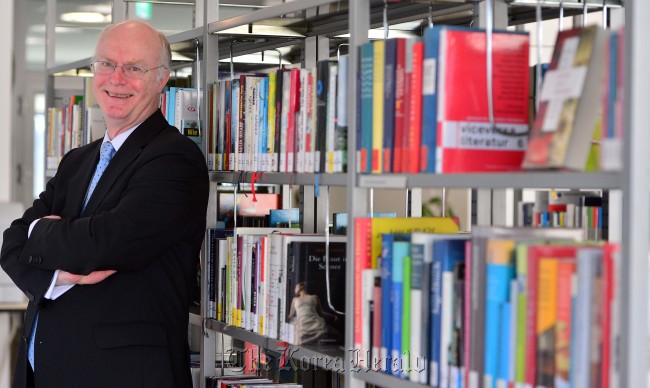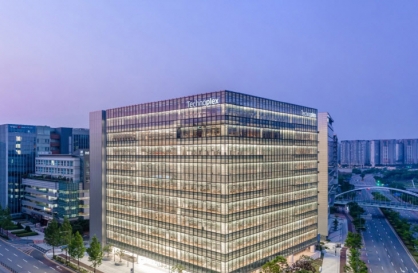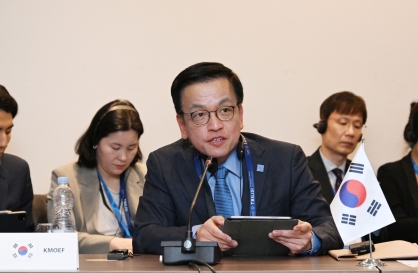
2년 간의 공사 끝에 독일문화원이 오는 3월 6일 남산 자락에 재개관한다.
이미 독일애호가들 사이에서 정평이 난 독일문화원은 재개관 기념으로 4일간의 문화행사들을 펼칠 예정이다.
3월 6일에는 어반테이너가 비디오매핑을 하고 안규철씨의 전시가 열리며 김덕수와 독일 재즈 듀오 슈테른클라의 잼콘서트가 3월 7일에 열린다. 안은미와 하우스댄스 그룹 그리고 디제이 드월터도 행사에 참여한다.
이 건물에는 150명 동시 수용이 가능한 공연장을 비롯 전시공간과 교실 등이 들어서게 된다.
독일문화원 슈테판 드라이어 원장은 코리아헤럴드와의 인터뷰에서 “독일에서 한국에 구체적으로 관심을 가지는 아티스트, 배우 그리고 제작자들의 수가 늘어나고 있습니다. 한국의 아트 페스티벌, 큐레이터 그리고 전반적인 현대예술의 장이 훌륭해서 생긴 결과입니다. 한국의 문화 예술은 너무 다양합니다. 한류가 전부는 아닙니다"라며 합작 공연에 대한 수요가 늘고 있다고 말했다.
사실 독일문화원은 이미 이 분야에 선두주자다. 1994년 독일의 뮤지컬이 한국어 버전으로 작은 극장에 올렸다가 엄청난 반향을 일으키면서 지금까지 한국에서 최장기간 상영된 뮤지컬이 됐다.
“지하철 1호선”의 성공이야기는 이미 전설이 되었고 독일문화원이 그 주역 중 하나인 것이다.
“이런 행사들을 좀 더 기획하고 있습니다. 위릴엄 포사이스의 ‘헤테로토피아’ 그리고 통영국제음악제에서 우리가 주최한 작곡경연 수상작인 초연될 것입니다.”
드라이어 원장은 한국 관객들에게는 뭔가 특별한 것이 있다고 말했다. “한국인들은 자신의 감정에 솔직합니다. 박수를 치고 손뼉을 치며 소리를 지르는 모습이 인상적입니다. 그들은 정말 큰 힘이 됩니다”
드라이어 원장은 점점 더 많은 수의 한국인들이 독일과 그 문화, 언어에 관심을 가지고 있다며 “유럽의 경제위기에서 독일이 파워풀한 인상을 주어서 그런 것도 있을 것입니다. 매년 4000명이 넘는 사람들이 독일문화원 서울 사무소에서 독일어를 배웁니다. 그리고 그 중 상당수가 독일이 문화 -- 음악, 문학 그리고 다른 부분 -- 에 관심을 표합니다"라고 말했다.
“독일문화원을 방문하고나서 독일인들이 한국사람들이나 다른 사람들이 생각하는 것만큼 딱딱하고 엄격한 사람들이 아니라는 것을 알았으면 좋겠습니다. 우리도 재미있고 웃기는 사람들이며 색다른 면들이 많다는 사실을 알아주세요.”
(코리아헤럴드 배지숙 기자)
<관련 영문 기사>
Goethe Institut to portray varied aspects of German culture
By Bae Ji-sook
After two years of renovation, the Seoul office of Goethe Institut, or the German Cultural Institute, is reopening at the cozy building on the hillside of Namsan Mountain in Seoul on March 6.
The institute that has been a central place for German-enthusiasts in Korea is holding a four-day event ranging from a video-mapping projection by local artist group, Urbantainers on March 6; exhibition by artist Ahn Kyu-chul; jam concert of samulnori master Kim Duk-soo and German jazz duo Sternklar on March 7; as well as dance performance by noted Korean dancer Ahn Eun-mee, House-Dance group and DJ Dewalta.
The building features a new concert hall that can seat more than 150 people at a time, exhibition spaces and newly furbished classrooms, said Stefan Dreyer, executive director of the institute.
“There are more and more German artists, producers and actors who have a specific interest in Korea, which have to do with the quality of festivals and curators, and the overall contemporary art scene. Korean art and culture are not only about hallyu but they have so many aspects,” said Dreyer said in an interview with The Korea Herald on Thursday.
“Also, there is a growing demand for co-production and other forms of exchange.”
And the Goethe Institut has been a leader in the field of cultural exchange. In 1994, it supported a Korean adaptation of German musical “Linie 1,” which was staged at a small theater in Seoul. The original plan was for a few weeks’ run but it became so popular that it was moved to larger performance halls and eventually became the country’s longest-running musical. The story of “Jihacheol Ilhoseon” or “Subway Line No.1,” became a local legend.
“We are planning some more events of the kind. This year, we are supporting ‘Heterotopia’ choreographed by William Forsythe in April and premiering the winning piece of the composition competition we conducted for the Tongyeong International Music Festival,” he said.
Dreyer said he has sensed something extraordinary from the Korean audience, which amuses not only him but all others. “They are very honest with their impression. The clapping, the applause, the shouts and other things are amazing. (The) Korean audience is really encouraging,” he said.
And the affection seems mutual. Dreyer noted that a growing number of Koreans are showing interest in Germany, its culture and language.
“It must be because of Germany was seen as ‘powerful’ in the time of the economic crisis in Europe. More than 4,000 people enroll at the Goethe Institut in Seoul alone every year and a considerable number of them express their passion about German culture -- the music, literature and others,” he said.
“I hope, after visiting the Goethe Institut, people will find many facades of Germany. I hope they will also find Germans less stiff and strict -- which are the usual images they have of us-- and instead understand that Germans can be quite funny and interesting in many different aspects,” he said with a smile.
(baejisook@heraldcorp.com)






![[Weekender] Korean psyche untangled: Musok](http://res.heraldm.com/phpwas/restmb_idxmake.php?idx=644&simg=/content/image/2024/05/02/20240502050841_0.jpg&u=)


![[Eye Interview] 'If you live to 100, you might as well be happy,' says 88-year-old bestselling essayist](http://res.heraldm.com/phpwas/restmb_idxmake.php?idx=644&simg=/content/image/2024/05/03/20240503050674_0.jpg&u=)







![[Herald Interview] Director of 'Goodbye Earth' aimed to ask how we would face apocalypse](http://res.heraldm.com/phpwas/restmb_idxmake.php?idx=652&simg=/content/image/2024/05/03/20240503050732_0.jpg&u=)
